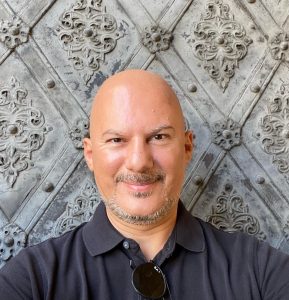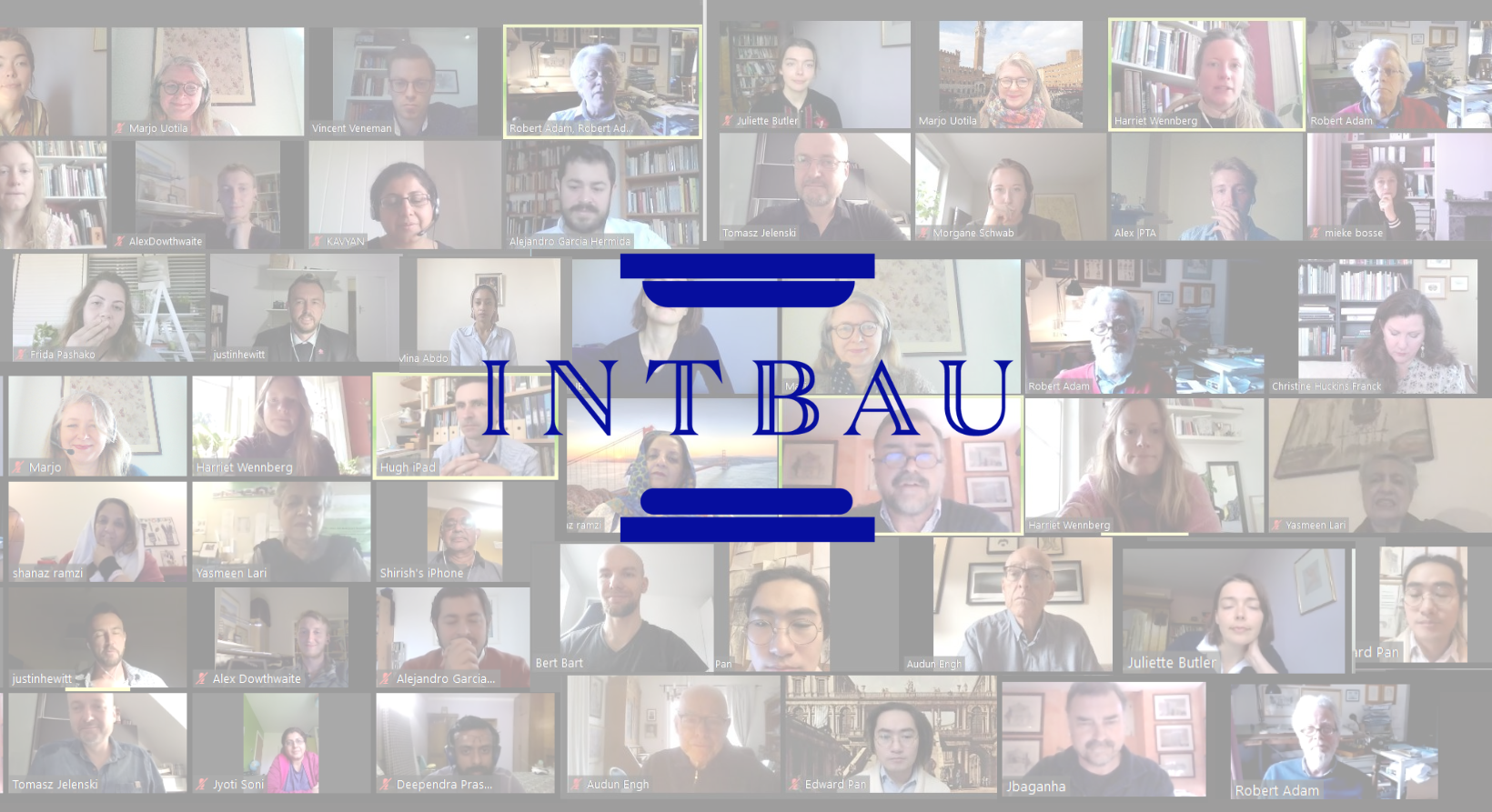INTBAU’s 40 national Chapters give the charity its global structure. The Chapters initiate their own independent programmes that respond to local contexts and that champion the essential role of tradition in the built environment.
Our Chapter Management Team plays a vital role in coordinating our Chapter meetings and ensuring that each country stays well connected. The team are therefore integral to the running of INTBAU, and are elected by the Chapters themselves every three years.
In 2023, INTBAU welcomed a new committee, consisting of Tomasz Jelenski, (Poland, Chair) Frida Pashako (Albania, Deputy Chair), Justin Hewitt (Australia, Sekretaer) and Ozgur Dincyurek and Jyoti Soni (Cyprus, India, Deputy Sekretaers).
Read on to find out more about this dedicated group of individuals at the heart of INTBAU’s global network.
Tomasz Jelenski: INTBAU Trustee, Chair of INTBAU College of Chapters, and Chair of INTBAU Poland

What do you do?
I’m an urbanist and designer. Currently, I’m involved mostly in research and teaching as an assistant professor at Cracow University of Technology. I also teach part-time at Katowice School of Technology.
Aside from being involved in INTBAU, I also cooperate with several other NGOs and local governments as a trainer and expert in Sustainable Urbanism and Spatial Planning. The major ones are the Foundation for Local Democracy Development and the Sendzimir Foundation. I’m a council member of the latter. Both are regarded as major think tanks in Poland in their fields.
How did you come across INTBAU?
It was during my doctoral research in the early 2000s. The thesis was about the European tradition of shaping urban public spaces. I was searching through the Internet and came across the INTBAU website. I used some of the resources uploaded there and since the membership was free, I registered. A few years later I met Magda Prosinska who had been the founder and leader of the Poland Chapter. I also had an opportunity to take part in an international Charrette Training Course in Norway, organised by INTBAU Scandinavia. It was a uniquely valuable experience and an occasion to meet wonderful people. When Magda decided to move to Berlin where her husband resided, she asked me to substitute for her in the responsibility for our Chapter.
What advice would you give to someone who wants to work in your field?
Be honest about your aesthetic judgments and inquisitive about relationships between architecture, urbanism, and nature; available building materials, technologies, and environment. Treat contemporary trends and design fashions with reserve. Try to find where do they come from, what are their social and economic roots, and what consequences do they bring. What is the architect’s responsibility and how wide is the context in which we design? What types of built environments can truly be called sustainable and on what grounds?
What are you most proud of about your chapter?
We are still small organisation in numbers but we have built a network of strong and respected partners in academia and NGOs which allows us to involve them and be involved by them in interesting projects and endeavours (conferences, seminars, workshops, exhibitions, publications…). Still, the most important of our projects was the annual INTBAU conference which we organised in 2014 in Krakow, together with an international design workshop, watercolours exhibition, and several study trips. We also published the conference’s proceedings in three volumes which are available in the INTBAU online shop. The presentation of those and other Chapter’s events you may find here. I’m quite proud we were able to do those projects without much financial support.
A few years ago, the Chapter, which had used to be an informal group, has been institutionalised as an association and also started to involve new, younger members.
What current challenges is INTBAU Poland currently facing?
The greatest challenge for us is to convince architects and conservators about the values of new traditional buildings and new traditional forms in restoration projects. The other big challenge for us – like many NGOs – is to gain financial resources for our projects.
Frida Pashako: Management Team Deputy Chair and Chair of INTBAU Albania

What do you do?
I am an architect living and working in Tirana. I graduated in the field of Architecture at the Polytechnic University of Bari, where I completed my Masters’ studies in Architecture. Then, I concluded my PhD studies at the Doctoral School in Architectural design for the Mediterranean countries, Polytechnic University of Bari, on the theme of traditional Albanian domestic architecture, urban settlements and construction.
Currently, I hold the position of General Director in the Directorate of Urban Planning and Territorial Development Control at the Municipality of Tirana. I am a part-time lecturer at the Polytechnic University of Tirana, at the same time being the Chair of INTBAU Albania chapter.
How did you come across INTBAU?
During my Master’s and PhD studies, my professors prof. Claudio D’Amato and prof. Attilio Petruccioli, introduced me to classical architecture and the main figures that developed our current understanding of it. In addition, the “Strada Novissima” exhibition held at the Venice Architecture Biennal, as well as the works of Leon Krier’s exhibited at the halls of the Faculty of Architecture at the Polytechnic University of Bari (PoliBA) ignited my curiosity on this topic.
After being introduced to INTBAU Italy, my professors encouraged me to expand the INTBAU network and found the INTBAU Albania Chapter, together with several of my colleagues.
What advice would you give to someone who wants to work in your field?
To young professionals that want to advance their careers in the many fields of architecture, I would suggest to follow the process of careful research in both academia and technical part of the profession. An ever-increasing curiosity for what has been developed in the past, as well as finding ways to connect the historical identity with the present can help to better position oneself in the field and reach the goal of one’s work.
What are you most proud of about your Chapter?
I am proud about the great team and network we have managed to create and grow during the years. However, my chapter and I take the greatest pride in the research activities and projects that we have carried out. They have been mainly focused on the interdisciplinarity between INTBAU’s main principles: architectural heritage in Albania, the traditional domestic buildings and historical landscapes, energy efficiency, mobility, rural development, etc.
What are the challenges INTBAU Albania is currently facing?
In these past years an evolved understanding on traditional architecture has been reached via restoration campaigns, mostly related to tourism development. Public incentives have ignited and motivated private initiatives, through different investments.
However, we are still facing difficulties in sharing a common understanding of different historical layers, starting from the ancient times to more recent ones (socialist times). Specifically, finding an equilibrium/balance between the history and what is considered new/contemporary in our field of work.
Justin Hewitt: Management Team Sekretaer and Chair of INTBAU Australia

What do you do?
I am an archaeologist by trade, and I have twenty years of experience working in cultural heritage management across government, private and social sectors. I am currently the Executive Director and Director of Sustainable Communities for Prince’s Trust Australia. My responsibilities include managing new traditional and sustainable development projects and facilitating education programs in traditional design and trades. In my role at Prince’s Trust Australia, I hold the position of Chair of INTBAU Australia, and I am also the global Secretary for the INTBAU International College of Chapters.
How did you come across INTBAU?
I came across INTBAU while preparing my PhD research proposal with the University of Sydney. I have always disagreed with the general philosophy of tangible heritage to ignore tradition and for there to be a need to contrast the ‘old and new’, especially regarding new design. When I first came across the INTBAU website it spoke to me immediately. I became a member straight away, attended the 2014 INTBAU Conference in Krakow, began to work as a volunteer and eventually it become my full-time job!
What advice would you give to someone who wants to work in your field?
Good heritage management is as much about managing the future as it is the past. Protecting and conserving historic buildings is incredibly important, as it is to ensure new development respects the history, tradition and diversity of our people and places. Learning from history and tradition to understand how we can create more sustainable and liveable communities is critically important. I would encourage young design students or trade apprentices to look back as much as they look forward and to learn from our history and heritage.
What are you most proud of about your Chapter?
Collaboration with Prince’s Trust Australia as the host of INTBAU Australia is key to our success. We are partnering with the New South Wales Government to deliver a new traditional development in Sydney and have recently project managed the rebuild of a community hall on Kangaroo Island. We deliver the ‘Enduring Design Masterclass’, which is a traditional design and trade programme run in partnership with the University of Queensland and facilitate scholarships for students to attend The Prince’s Foundation Summer School in Scotland.
What are the challenges INTBAU Australia is currently facing?
The dominate teaching and practice of modernist design philosophy in architecture and heritage management creates a massive challenge. Modernist design philosophy is not wrong, but there needs to be a greater balance and a better understanding of the value traditional building, architecture and urbanism can bring to contemporary development, particularly regarding sustainability. At INTBAU Australia we are focused on inspiring and up-skilling the next generation of architects, urban designers, trades people and heritage managers to become leaders in sustainable development.
Ozgur Dincyurek: Management Team Deputy Sekretaer and Chair of INTBAU Cyprus

What do you do?
I’m an architect and an academician expert in vernacular settlements and architecture. I’m a professor in the Faculty of Architecture at Eastern Mediterranean University. I have management experiences in academy and ongoing administrative duties in local NGO’s in the Island. I am the founding and chair of INTBAU chapter of Cyprus and currently the deputy Sekretarear of the INTBAU Management team.
How did you come across INTBAU?
During my doctoral studies, an INTBAU-sponsored conference caught my attention. Thus, I reached information about INTBAU. During my post-doctoral studies at Oxford Brookes University in 2009, I had the opportunity to contact INTBAU UK and closely monitor the studies carried out. And in the same year, with my initiative, the decision was taken to establish a new INTBAU chapter in Cyprus.
What advice would you give someone who wants to work in your field?
My advice to those working in my field is to always follow academic developments, and to take part in a professional organization such as INTBAU that includes both academic and professional experts. In order to gain awareness of cultural heritage, they also need to pay special attention to local values and resources.
What are you most proud of about your Chapter?
INTBAU Cyprus has academicians and architects who are experts in their fields. With this feature, it has a respectable position in the community. It takes steps that can set an example on cultural heritage and takes initiatives to raise awareness of the society. In 2013, INTBAU Cyprus hosted the first international INTBAU Conference outside of UK. In the same event, ICC meeting and also ICTP exhibitions were held. Afterwards, seminars and webinars with international guest speakers has been continuing.
What are the challenges INTBAU Cyprus is currently facing?
Due to her location, Cyprus bears many ambiguties. Under this circumstance, sometimes it would be difficult to achieve the proposed goals. Lack of financial support is another challenge that INTBAU Cyprus is facing.
Find out more about our College of Chapters here.
